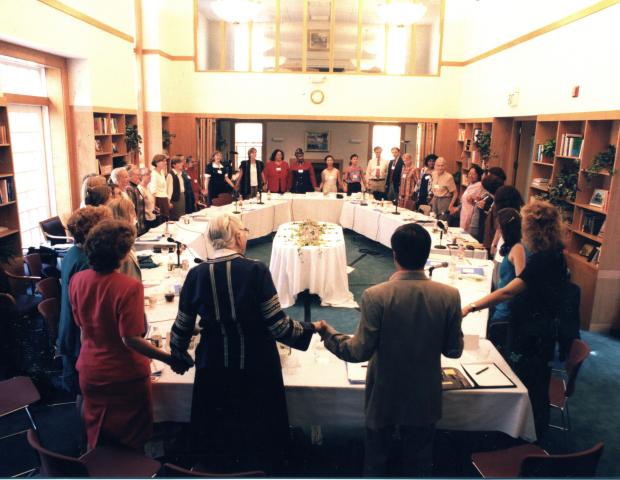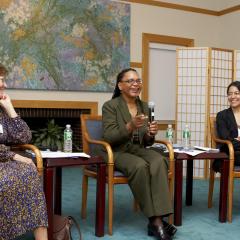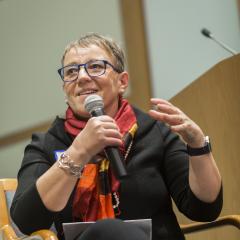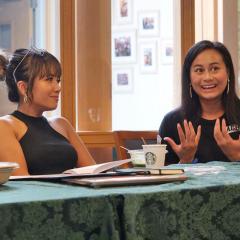Women Leaders Review Earth Charter
During the late 1990s the Center (then the Boston Research Center, or BRC) focused considerable energy on helping to draft the Earth Charter, a declaration of “fundamental ethical principles for building a just, sustainable and peaceful global society in the 21st century” This report by Helen Marie Casey details the Center-sponsored Women’s Consultation on the Earth Charter, held September 19, 1997. The event illustrates how the Center has endeavored to promote women’s leadership as we shape a flourishing twenty-first century.
A Report From the Conference
As students across the nation returned to campuses this September, the Boston Research Center brought together scholars, global activists, and spiritual leaders for a Women’s Consultation on the Earth Charter. In honor of the 1995 UN Conference on Women in Beijing, the Earth Charter forum was an extension of the BRC’s commitment to focus each fall on women’s leadership. Women’s role in sustainable development and in the protection of the environment remained pivotal elements of the afternoon’s presentations and subsequent dialogue.
In her welcoming remarks, Center director Virginia Straus posed two questions:
- How does the Earth Charter fit into women’s agendas?
- What is women’s role in the Charter’s evolution?
Maximo Kalaw, executive director of the Earth Council, enlarged the question: How, he asked, do we create a movement that is owned by the people? What is the process required to make the Earth Charter a people’s charter? “The Charter,” Mr. Kalaw suggested, “must be a living and dynamic vision that is relevant to our time and future.” It must “bridge the gap between ecology and economics.” Further, he suggested, we must be able to define a system that keeps the focus on our objectives of obtaining justice, peace, equality, and equity.
“The basic lesson of sustainable development,” Mr. Kalaw emphasized, “is that everything is interconnected and that life is sacred.” Further, he offered, there are three kinds of values that should be reflected in the Charter. First, the Charter should affirm our identity as spiritual, cultural, biological, political beings who have an active role to play. Second, the Charter must address the myriad relational values between the human being and society. Third, the Charter must address issues of process: How do we make decisions, share information, and transform conflicts? In sum, Mr. Kalaw suggested, formal consultations must address these two aspects of the Charter: the text itself and the values that underlie the text. Ultimately and ideally, the spirit of the Charter should become so pervasive that it permeates popular culture.
A Multiplicity of Transformations
Sociologist, author, and peace activist Professor Elise Boulding sounded a somber note when she observed that “We’ve had a century of trying to create the ways of peace on the planet. Instead of being better off than we were 100 years ago, we are considerably worse off.” What we are learning, she continued, is that “unless we expand to an understanding of the relevance of environment and development and human rights … the end of war will continue to elude us.”
Like Maximo Kalaw, Dr. Boulding stressed that we must have a people’s movement, a movement that is larger than the coalition of peace groups, a movement that encompasses a whole range of organizations that learn to collaborate. “Peace Culture,” the Emerita Professor of Sociology posited, “is a mosaic of identities, attitudes, values, beliefs, and institutional patterns that lead people to live nurturantly with one another and with the earth itself without the aid of structured power differentials. That mosaic enables humans to deal creatively with their differences and to share their resources.”
If we incorporated into our lives the kind of change of consciousness embodied in the principles of the Earth Charter, Dr. Boulding surmised, it would mean “changing absolutely everything we do in our daily lives.” “I’m appealing,” she continued, “to all the people’s organizations that I’m in touch with — peace, environmental, and women’s organizations, above all — to prepare themselves for the consciousness change work…. The women’s movement has to become the teachers and leaders for the consciousness change that will make the Earth Charter…accepted.”
Professor Boulding suggested, as she concluded her remarks, that we look to our children and ensure that “the kind of learning we get from being in nature,” which is “different from anything we get out of a book, and certainly different from anything we get from a TV screen,” be guaranteed our young people.”
“Of course the goal of the Earth Charter is transformation of consciousness,” Patricia Mische, president of Global Education Associates, concurred. Ultimately, the transformation will be at the “intergovernmental level, but most importantly and profoundly, [at] the level of people and our behavior everywhere around the world.” She continued, “When the UN Charter was drafted 50 years ago, ecological security was not in anybody’s mind as being part of the definition of peace and security. The UN itself is, however, a living organism that is evolving and expanding in it definition of peace and security.”
The UN has extended the definition of peace and security to include human rights and economic development, she explained. Following citizen movements in the 1960s, that vision has continued to expand. The Stockholm Conference on the Human Environment Program (UNEP), whose task it was to infuse and coordinate environmental concerns. UNEP accomplished many things, such as coordinating many multilateral agreements on the environment, but many of them were piecemeal. “There was no comprehensive framework for thinking yet about ecological security,” Dr. Mische observed.
“Elise Boulding and I,” Dr. Mische continued, “had been part of a peace research group call the Exploratory Project on the Conditions of Peace. A brilliant idea came from that exploratory project and it was that we undertake citizen treaties, that we not wait for governments. Citizens would build peace from the ground up.”
In 1988 a citizen diplomacy initiative between Russians and Americans resulted in a Soviet-American citizens’ treaty on ecological security. This quickly moved to open a wider process which resulted in the Earth Covenant, a citizens’ treaty on global ecological security, which was taken to the 1992 Rio Conference on Environment and Development. Following Rio, the Earth Council was formed with one of its mandates to follow up on an Earth Charter to complement the UN Charter.
The Earth Council has been in the process of bringing groups together to continue the evolution of the Benchmark Draft. A final draft of the Charter will be presented to the United Nations next June for endorsement as a citizens’ agreement. “What is the significance of this process?” the global educator asked. If this Charter is endorsed by the UN by the year 2000, “it will enter into our behavioral mode and transform consciousness.” This movement is related to the vision of people like Teilhard de Chardin, Mische elaborated, a vision that recognizes that human beings have tremendous responsibility to be conscious and to choose their behaviors wisely because they have an impact both on the human community and the further evolution of creation.
“This Earth Charter process,” Susan Davis, Executive Director of the Women’s Environment and Development Organization (WEDO), postulated, “embodies a vision of principles-centered evolution.” This process, she continued, “is one that I would consider a goal for my own life in terms of answering the questions: What constitutes the good life? What’s life for? What’s worth living and dying for? What is the end goal, both from an ecological perspective and from the perspective of the evolution of the earth itself?
Women, she observed, are “often united by what we’re against. We are against racism and sexism; we are against the oppression of poverty; we’re against the rapaciousness of an industrialized global economy that’s going out of control. But often we’re not united in what we are for. This is an opportunity for the women’s movement,” Ms. Davis went on, “to provide necessary energy and leadership.”
The advocate for social justice, sustainable development, and women’s rights explained that she had initially been suspicious of the Earth Charter but found a vast opportunity for dialogue with people who “really don’t get it in terms of the population debate; people who don’t understand what a women from the South is trying to explain when she says we need the right to control our own bodies and our family size — and population control is not it, and people who try to explain the tension between the environmental ethic proposed by well-intended citizens of the North with the real tension that exists from the lack of social justice in the South.
Elaborating on Principle 3 of the Earth Charter, Live sustainably promoting and adopting modes of consumption, production, and reproduction that respect and safeguard human rights and the regenerative capacities of Earth, Ms. Davis talked about the history of the formulation of this principle. It does not contain the word “population” anywhere in it, but instead underscores the delicate balance and shared responsibilities we posses and does so in a way that is empowering for women.
“We really must understand all of these issues with a gender perspective,” Susan Davis insisted. “Gender equality is not a luxury. It’s not an afterthought. It is a prerequisite for anything that can be fashioned and [legitimately] called sustainable development. We’re talking not just about ending oppression. We’re talking about unleashing leadership, creativity, and real wisdom. We will not get there without achieving gender equality.”
Susan Davis urged her listeners to remember that “you can’t talk about war and militarism unless you are prepared to deal with the violence that happens every day in silence in the family.” She passionately exhorted: “We should fight to make sure that people figure out how to really hear what we are saying.”
Esmeralda Brown, Southern Co-Chair of the NGO Steering Committee for the UN Commission on Sustainable Development, shared with the forum her reactions to the Benchmark Draft of the Earth Charter and her wish for a final document in which all stakeholders at risk have had an opportunity to make suggestions and recommendations. “The final Earth Charter,” the NGO activist proposed, “will be so basic and crosscutting, and so rooted in the goals, dreams, and aspirations of the peoples of the world that it will serve as a guidepost to those who are involved in the day-to-day struggle of creating a better world.”
As she spoke of the kind of Charter she envisioned, Mrs. Brown stressed that “to have an Earth Charter that does not address racism and ethnic discrimination would make such a Charter less than fully relevant o a large number of people in the world.” Further, “a Charter that does not utilize the word inclusiveness as a criterion in terms of governance and does not enunciate the sanctity of self-determination without outside interference, manipulation, extortion, or intimidation, would be a deficient Charter.”
A comprehensive Earth Charter, the Latin American spokeswoman explained, cannot be “primarily about environmental concerns but must deal with human beings. It must be human-centered. It must deal with the present glorification of greed by powerful multinationals under the guise of the marketplace and free trade.” The Benchmark Earth Charter, Esmeralda Brown concluded, “is a good beginning, but we must work to make sure that through a process of worldwide consultation it ends up meaning as much as possible for as many of the human beings of the world as possible.”
Beatriz Schulthess of the Earth Council’s Indigenous Peoples Program focused her remarks on women’s need to make the Charter their own by reflecting on it and bringing it to the attention of a diversity of women. “We have to create or rediscover a new relationship among women of different cultures and social sectors of society,” she suggested.
Speaking for indigenous women, Ms. Schulthess reminded listeners that “spirituality is a strong basis for all indigenous societies.” She acknowledged that “we adopt new technologies; we send our children to schools; we adopt different economic trends.” But, she insisted, “we have our own economic systems which we would like to keep.” She indicated that the values of indigenous peoples must be acknowledged: respect for all living beings, community life, solidarity, dignity, and authenticity.
“For us,” she elaborated, “the earth is alive. It has its own entrails. It coughs. It spits. It shakes. The earth nourishes all of those who live on it and in it — as a mother feeds her children.” Furthermore, “There is a need to find mechanisms to reconcile and to harmonize all the different forms of acquiring knowledge which exist in our world.” It is not acceptable that some of the knowledge of indigenous people is literally being stolen. Indigenous people, she observed, should not be separated from their traditional educational system which emphasizes observing and learning the language of plants, animals, and minerals. While many outside observers refer to indigenous people as “poor,” in fact, Ms. Schulthess, insisted, “In our view of the world, if we have our land, our food security, a roof over our head, our education and, of course, if we have good health, we don’t think that we are poor.”
The afternoon’s panel presentations concluded with the remarks of Soon-Young Yoon, activist, anthropologist, and columnist for Earth Times. “The Earth Charter,” Dr. Yoon began, “calls for a value-based world view in which personal ethics are connected to principles of justice and global well-being. Who can articulate this better than women activists in the international women’s movement? Women are experts on how to achieve a consensus out of discord.”
The Platform for Action approved at the 1995 Beijing Women’s Conference, she recalled, “transforms our concept of women’s rights by broadening it from a legal to an ethical norm. As such it alters the moral premise for implementation and accountability. ‘Women’s rights as human rights’ is not a narrowly defined political concept. Rather, it is relevant to personal behavior in the home and in the public domain. Most important, women’s rights include the rights to development, equality, and peace.”
The gender concept included in the Platform asserts that “biology is not destiny.” It asserts, Dr. Yoon continued, “that gender inequality is a social construct of relations between people. A gender perspective on sustainable development and population issues implies that these are not primarily related to women’s reproductive roles.”
The former Fulbright Senior Fellow asserted, in closing, that “the international women’s movement is the largest, most revolutionary nonviolent movement for social change in the twentieth century. It is conceivable,” she maintained, “that this movement will show the way our of the blind rationalism and crass materialism of our age.” She urged the assembled participants to mobilize for the success of the Earth Charter initiative.
Crucial Implications
In the discussion that followed the panel presentations, several key observations, which focused largely on economic values, were offered:
- Women seem to share a long-term perspective. This is a tremendously important aspect of any kind of ecological change.
- Even in the most impersonal exchanges, women have a tendency to create human connections.
- An important dimension of feminist economics is changing what we value, such as the unpaid and uncounted labor of the caring economy.
- We can choose nonviolent alternatives to the claw-and-scrape-our-way-to-the-top attitudes that presently prevail.
- To change our behaviors, we must ask ourselves the questions: What can I do about this today? What immediate steps can I take?
- Women in the arts should be engaged in our discussions to effect change.
- Women are effective in bringing people together and seeing things in a holistic way. We must involve all people in these discussions: people in the board rooms, corporations, families.
- Each woman must assume a personal obligation to go out and talk to others about what we are learning or else the dialogue we desire will never occur.
The forum concluded with participants forming a circle of commitment as a gesture of solidarity in the work of peace and justice.



